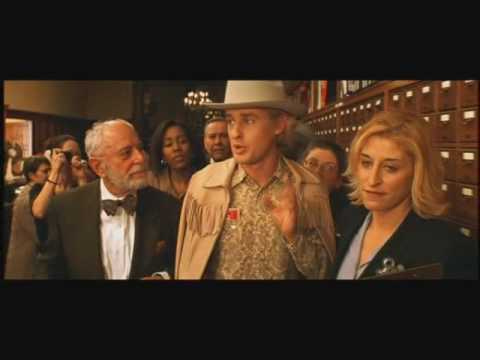📌 Nonwords, Portmanteaus, Empty Nouns, and Other Delightful Nonsense
Sometimes you *can* make it up as you go along
I was typing away again last week when I hit the spot in a sentence where I wanted just the right word to describe how my budding career felt. At the time, it felt like when you look out in the desert and think you see an oasis…but you aren’t quite sure if it’s something to celebrate or merely a mirage.
Anyhow, as I pondered, my mind shot back to the character Eli Cash’s book reading in The Royal Tenenbaums. Specifically, to a word he used in his reading—friscalating.
I love this scene for so many reasons—the profound ridiculousness that beats in unity with the aspirational. But…I have also actually always loved the read-aloud itself! That little snippet of the book undeniably sets a scene.
Sure, I hadn’t heard of two of the words Eli used in Old Custer, of course…(which makes sense, given he said he wrote the imaginary book in “a kind of obsolete vernacular”), but friscalating, well, I felt maybe I had? During SAT prep back in the day, perhaps?
Friscalating. It might work to describe my mood! I imagined it meaning…the sparkle, but one you see and you’re not sure if it’s reality or mirage? I certainly didn’t want to misuse it, though, so I looked it up.
Well, reader, let’s cut to the chase. Here’s what Merriam-Webster informed me.
I had not heard friscalating outside of this movie. I couldn’t have. It was entirely made up. All three “obscure” words were not words at all; in fact—they were nonwords.
Nonwords
What’s a nonword? (I mean if we are going to go down this dictionary rabbit hole, let’s really put our backs into it, shall we?) I think the Oxford dictionary describes nonwords best.
It SOUNDS like a word. It follows the “rules” of language. It’s just…not. It’s made up.
Which leads me to…
Portmanteaus
A portmanteau combines two words (and meanings) through wordplay into a new, easily-understandable concept. Well-used ones include smog (smoke fog), brunch (breakfast and lunch, all at once), and labradoodle (a half-labrador, half-poodle dog).
I learned the term (and concept) of a portmanteau from author Sudipta Bardhan-Quallen, and I have to say, she’s a *master* at creating them, with titles in her published book quiver like Quackula, Splatypus, Hampire, Purrmaids and more.
The thing about a great portmanteau is that people, simply by seeing or hearing it, could give a reasonably accurate guess of what you are talking about. If you have to explain it much, it’s probably not portmanteau material.
Empty nouns
This is a term I first learned from author-illustrator Jim Averbeck, and I love the whole concept. It’s basically when you create a ‘new’ noun that doesn’t mean anything in and of itself but works in the text to replace general nouns—like “thing” or “someplace,” etc. It makes the general nouns specific (though imaginary)—and gives an illustrator a particular mood to work with. One example he gave is the term “Wild Things” in Where the Wild Things Are. Another example I thought of was, of course, Julia Donaldon’s The Gruffalo. It could be something as basic as naming a fictional town Funkville—or as complicated as using Mrs. Klauswhipple Von Slappington* instead of “piano teacher.”
*I call dibs on this character's name!
What’s the meaning of all of this?
On the one hand, we are not here to trick children into using nonwords without understanding that they aren’t words. I think, for that reason, there has been, over time, a move away from “just make it up” kind of language within picture books. That is, making up nonsense (not always, but sometimes) JUST for the sake of making up nonsense.
On the other hand—children, themselves, are experts at this kind of language play! They positively revel in it—sometimes on accident, sometimes on purpose. I think perhaps, then, it all depends on context. Making it clear that the nonword IS a nonword through context and subtext so that kids are in on the joke. Using nonwords, portmanteaus, and empty nouns with purpose.
In short, the nonsense should have meaning—meaning we imbue through our creative work on the creative work. (A great example of a picture book with its own entirely-invented language system—that purposefully invites children in to play—would be Carson Ellis’s Du Iz Tak?—which apparently created some interesting foreign translation challenges. )
After all, all new things start somewhere. Yesterday’s nonword, portmanteau, or empty noun may become, with adoption, tomorrow’s neologism, made “real” à la Pinocchio.
Yours in friscalation and cromulence,
Elayne
UPDATE: I am learning so much from people who responded to this post already! A very special thank you to Tim Canny (who writes children’s stories under the name Francis S. Poesy) for sharing the following meaningful nonsense:
Metaplastic words. Metaplasia describes mutation within cells; similarly, this blog - Metaplasm: A Journal of Metaplastic Words, marks the mutations of various words as spotted in the wild.
One of my favorites describes using the term ‘weary’ accidentally in place of ‘wary’, with the example: “I'd be a little weary of doing that.” There IS an undercurrent of being weary within being wary, so it’s both funny and charming.
Pwoermds. A pwoermd is a one-word poem without a title. They may be created purposefully or by accident (a typo that is later found to be pleasing). You can travel the Twitter timeline of these quirky poems by searching #pwoermds.
I especially liked this one.
My posts are always free, but my focus isn't; if you found this post interesting or useful, please consider ♡’ing it so I know. Thank you!








Useful AND a fun read!